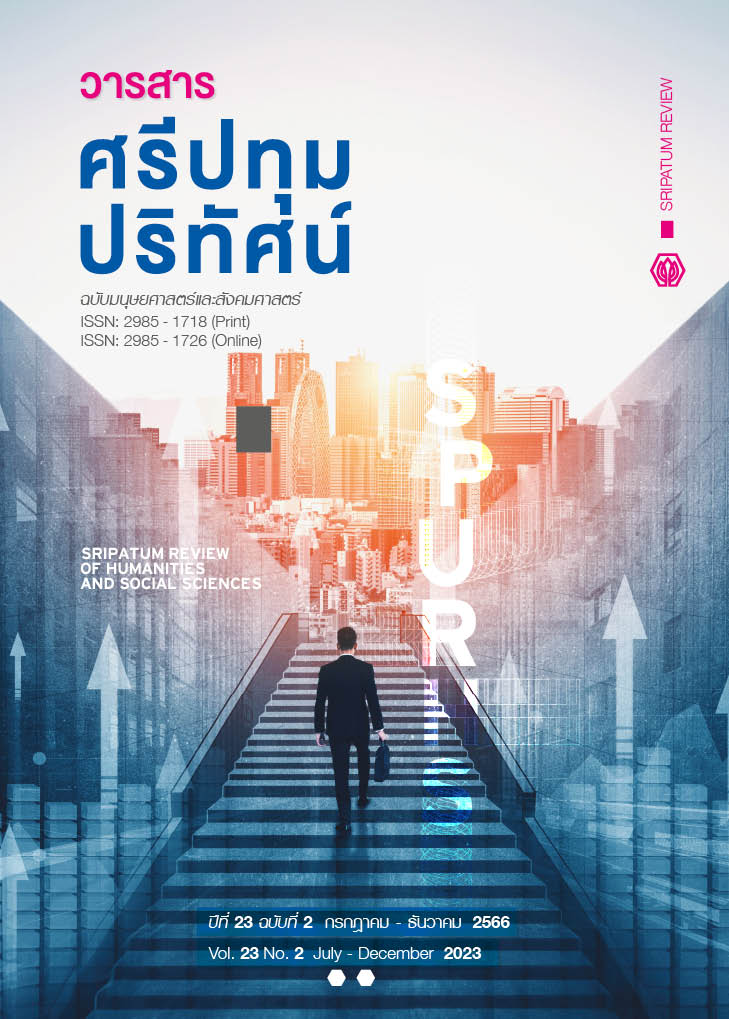The Mathematical-Modeling-Based Learning Management to Promote the Mathematics’ Abilities of Grade 12 Students
Main Article Content
Abstract
The objectives of this research were to (1) create the learning management using mathematical modeling which was EVOAC model and (2) study the mathematics’ abilities after learning with mathematical modeling on the topic of applied derivatives and integrals of functions of grade 12 students. This study was a pre–experimental research. The sample from cluster sampling was 1 classroom, 37 students of grade 12 at Kowitthamrong Chiang Mai School. The data were analyzed by percentage, mean, mode, standard deviation, coefficient of variation and t – test for research hypothesis investigation. The results showed that 1) learning plans using a mathematical modeling, EVOAC model, consisting of 3 contents, 8 lesson plans spending 17 hours. The suitability assessment of the learning management plans applying EVOAC model was at a very good level and 2) the results of mathematics’ abilities assessment after learning with this model were higher with having the difference of mean of 21.51. Moreover, it was found the mean after learning was higher than before learning at 0.01 significantly.
Article Details

This work is licensed under a Creative Commons Attribution-NonCommercial-NoDerivatives 4.0 International License.
1. กองบรรณาธิการสงวนสิทธิ์ในการพิจารณาและตัดสินการตีพิมพ์บทความในวารสาร
2. บทความทุกเรื่องจะได้รับการตรวจสอบทางวิชาการโดยผู้ทรงคุณวุฒิ แต่ข้อความและเนื้อหาในบทความที่ตีพิมพ์เป็นความรับผิดชอบของผู้เขียนแต่เพียงผู้เดียว มิใช่ความคิดเห็นและความรับผิดชอบของมหาวิทยาลัยศรีปทุม
3. การคัดลอกอ้างอิงต้องดำเนินการตามการปฏิบัติในหมู่นักวิชาการโดยทั่วไป และสอดคล้องกับกฎหมายที่เกี่ยวข้อง
References
Buason, R. (2013). Qualitive research in education. 1st edition. Bangkok: Chulalongkorn University Printing House. (in Thai)
__________. (2017). Research and Development in educational Innovation. 2nd edition. Bangkok: Chulalongkorn University Printing House. (in Thai)
Chomphucome, P. (2018). Mathematics Learning Management (Online). Retrieved May 22, 2023, from: http://www.phichsinee.cmru.ac.th/develop/article/file/3103131916.23. (in Thai)
__________. (2022). Statistics for Research (Online). Retrieved May 22, 2023, from: http://www.phichsinee.cmru.ac.th/elearning/stat_research. (in Thai)
Fongsri, P. (2008). Educational assessment: concept into practice. 5th edition. Bangkok: Dan Suttha Publishing Company Limited. (in Thai)
Gonphila, N. (2021). The Effect of Organizing Learning Using Realistic Mathematics Education About Ratio and Percentage on Mathematical Problem-Solving Ability and Mathematics Learning Achievement of Mathayomsuksa I Students. Thesis of Master Of Education in Mathematics: Srinakharinwirot University. (in Thai)
Hernández, L., Rachel L., Mathew F., and Rose Z. (2017). Mathematical Modeling in the high School curriculum. The Variable: An SMTS Periodical, 2(2), 18 – 25.
IPST. (2017). Programme for International Student Assessment Framework 2015. Bangkok: IPST. (in Thai)
Kanachan, J., Kaewkhamson, K., Nongharnpituk, P., and Khansila, P. (2020). A Study Of Learning Achievement in the Applications of Derivative Topic for Grade – 12 Students Taught by Incorporating GeoGebra Program into Mathematics Problem – Solving Based on Polya’s Method. Journal of Science and Science Education, 3(1), 73 – 83.(in Thai)
Kanthawat, C. (2018). An Action Research on Developing Grade 11 Students’ Mathematical Literacy through Mathematical Modeling in Topic of Sequences and Series. Thesis of Master of Educaton in Mathematics: Naresuan University. (in Thai)
Ministry of Education [ME]. (2017). Learning Standards and Indicators in Mathematics: Basic Education Core Curriculum A.D. 2008 (update 2017). 1st edition. Bangkok: Printing Company Limited Agricultural Cooperative Federation. (in Thai)
Nenthien, S. (2017). Mathematics Learning with Real-World Problems Based on Mathematical Modeling. Journal of Education Studies, 45(2), 238 – 253. (in Thai)
Office of Coordination and Promotion of the Private Education Commission, Chiang Mai Province [OCPPE]. (2017). Private education quality development plan, Chiang Mai Province, Academic Year 2017 – 2021. (in Thai)
Panpanya, S. (2014). Application of Mathematics for Industrial Arts Education (Online). Retrieved May 22, 2023, from: http://pws.npru.ac.th/october/data/files. (in Thai)
Sonchiu, K. (2020). The Development of Prathomsuksa 3 Students’ Mathematical Computation Ability through the Use of Natural Approach in Mathematical Thinking. Thesis of Master of Educaton in Curriculum & Instruction: Dhurakij Pundit University. (in Thai)
Viriyapong, R. (2021). Introduction to mathematical modeling with differential equations. 1st edition. Phitsanulok: Naresuan University Publishing House. (in Thai)
Wangsila, P. (2018). The Study of Using Mathematical Modeling to Enhance Mathematical Creative Thinking in Geometric Analysis Topic for 10th Grade Students. Journal of Education Naresuan University, 22(3), 150 – 163. (in Thai)
Yodsawarin et al. (2016). Instructional Activities to Enhance the Ability to Apply a Mathematical Model to Solve Mathematical Problems Related to Algebra for Mathayomsuksa Four Students. Srinakarinwirot Science Journal, 33(1), 249 – 264. (in Thai)


